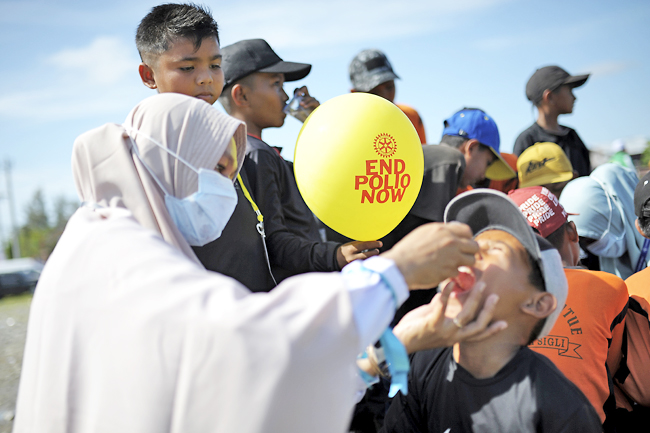PIDIE, INDONESIA (AP) – Children in school uniforms and toddlers with their parents lined up yesterday for polio vaccinations in the Sigli town square on the northern tip of the Indonesian island of Sumatra, after four children were found infected with the highly contagious disease that was declared eradicated in the country less than a decade ago.
The virus was first detected in October in a seven-year-old boy suffering from partial paralysis in the province of Aceh near Sigli, and since then three other cases have been detected, prompting the mass immunisation and information drive.
Official said that polio immunisation rates in the conservative province are well behind the rest of the country, with efforts hampered by widespread disinformation, among other things.
The government has also been prioritising COVID-19 vaccinations since they became available.
The campaign that started yesterday aims to vaccinate some 1.2 million children in the province, said the Health Ministry’s director general for disease control and prevention Maxi Rein Rondonuwu.
“There is no cure for polio, the only treatment is prevention and the tool for prevention is vaccination,” Rondonuwu said, adding that the child is still able to walk, albeit with a limp.
With some 275 million people, Indonesia is the world’s fourth most populous, and the largest Muslim-majority nation.

Aceh is particularly conservative, and is Indonesia’s only province allowed to practice Syariah, which was a concession made by the national government in 2006 to end a war with separatists.
False rumours that the polio vaccine contains pork or alcohol, prohibited according to Muslim beliefs, have proliferated, especially in rural areas, complicating vaccination efforts, said the head of the Aceh Health Office Hanif.
“We cannot work alone, we need support from all parties, including religious leaders, so that people understand the importance of immunisation,” said Hanif.
Azhar, the father of the seven-year-old who contracted polio, said he had opted not to immunise his son after other villagers where he lived told him the vaccines may cause harmful chemicals or non-halal substances.
“My neighbours said that my son don’t need to be immunised and I didn’t want my son get sick because of harmful chemicals that are against Islam,” the 45-year-old said.
For Dewi Safitri, a mother of three who was getting them vaccinated yesterday, it was simply a matter of not knowing it was necessary.
She said she was convinced after health workers spelled out the risks of paralysis or death if her children were to go unvaccinated.
“I didn’t even know about immunisation,” she said.
The World Health Assembly adopted a resolution for the global eradication of polio in 1988 and since then, wild poliovirus cases have decreased by more than 99 per cent, according to the World Health Organization (WHO).
It was eradicated in Indonesia in 2014, and is today only still endemic in two countries – Afghanistan and Pakistan. Last week, new poliovirus cases were found in Afghanistan, Algeria, Chad, Democratic Republic of Congo, Ethiopia and Nigeria, according to the WHO’s Global Polio Eradication Initiative.
Of the three other children in Indonesia from the same village as the initially confirmed case none had their basic vaccinations, Rondonuwu said. “It has to be reported as an outbreak, because it had been declared eradicated in Indonesia, but it turns out that there is still wild polio virus,” he said.
Rondonuwu said they are keeping a close watch on the cases by doing door-to-door screening to ensure that there are no additional infections that have not been reported.
Indonesian epidemiologist from Australia’s Griffith University Dicky Budiman said the discovery of polio in Aceh must be responded to seriously because “the threat is real for Indonesia”, noting that basic immunisation coverage is still low, putting the country in a high-risk category.
“This is what the government really has to pursue, because it’s dangerous if we don’t,” Budiman said. “We must move immediately by strengthening basic immunisation or there will be a potential additional health disaster for Indonesia.”



